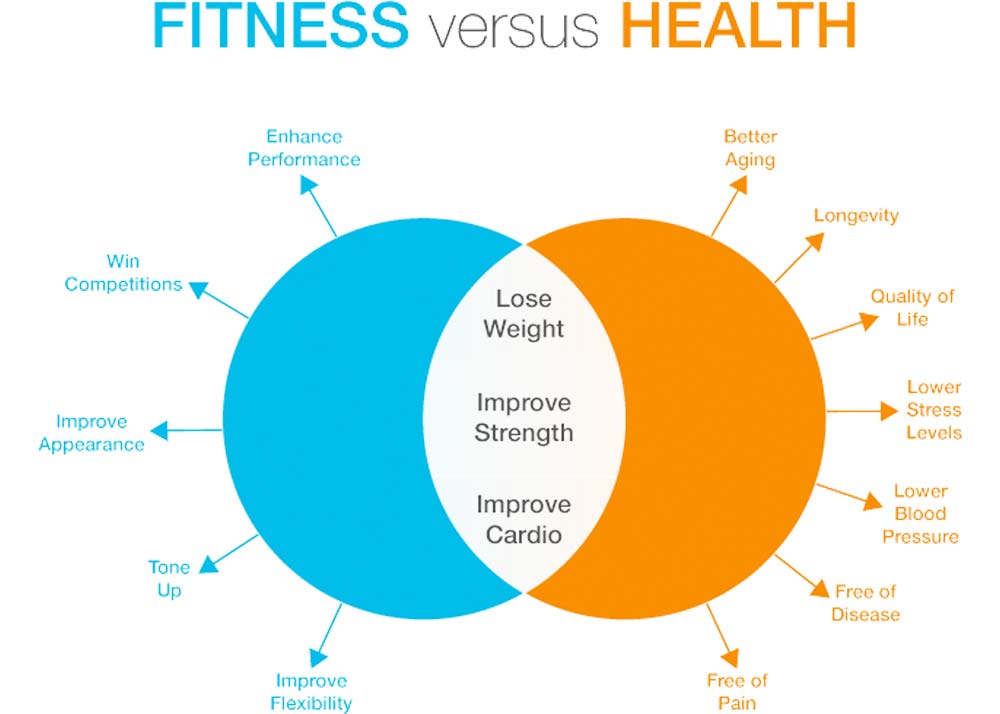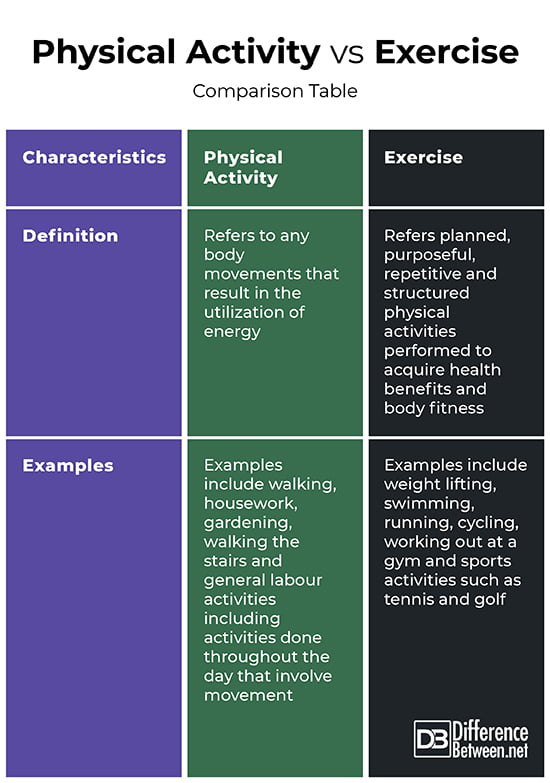Have you ever wondered about the difference between exercise and fitness? They may seem like similar concepts, but there are some important distinctions to be made. Let’s dive into the topic and explore how exercise and fitness differ from each other.
When it comes to exercise, we often think of physical activity and movement. Exercise is the specific actions we take to engage our bodies in physical exertion, such as going for a run, lifting weights, or practicing yoga. It’s the intentional and purposeful movement that helps us build strength, endurance, and flexibility. Exercise is like the individual puzzle pieces that come together to create the bigger picture of fitness.
On the other hand, fitness is a broader concept that encompasses more than just exercise. Fitness refers to our overall health and well-being, including our physical, mental, and emotional state. It’s the result of consistent exercise, healthy eating habits, and a balanced lifestyle. Fitness is the puzzle itself, made up of various interconnected pieces, such as cardiovascular health, muscular strength, body composition, and mental resilience.
So, while exercise focuses on the specific actions we take to improve our physical capabilities, fitness encompasses a holistic approach to overall well-being. By understanding this distinction, we can better navigate our fitness journeys and prioritize both exercise and other factors that contribute to our overall fitness.

How Do Exercise and Fitness Differ?
Exercise and fitness are two terms that are often used interchangeably, but they have distinct meanings and implications. While they are related to each other, understanding the difference between exercise and fitness can help individuals develop a more comprehensive approach to their overall health and well-being.
Exercise: The Physical Activity Component
Exercise refers to any physical activity that is planned, structured, and repetitive with the aim of improving or maintaining physical fitness. It involves engaging in specific movements or actions to strengthen the body, enhance cardiovascular health, increase flexibility, or improve overall physical performance.
Regular exercise is essential for maintaining a healthy weight, preventing chronic diseases such as heart disease and diabetes, and improving mental health. It can include activities such as walking, running, cycling, swimming, weightlifting, and participating in sports.
Exercise can be categorized into different types, including aerobic exercise, strength training, flexibility exercises, and balance exercises. Each type of exercise targets specific aspects of physical fitness and provides unique benefits to the body.
Aerobic Exercise
Aerobic exercise, also known as cardiovascular exercise, is any activity that increases the heart rate and stimulates the cardiovascular system. It involves continuous rhythmic movements that require oxygen to meet the body’s energy demands. Examples of aerobic exercises include jogging, cycling, dancing, and swimming.
Engaging in regular aerobic exercise improves cardiovascular health, increases lung capacity, boosts endurance, and helps with weight management. It also releases endorphins, which are natural mood boosters, promoting mental well-being.
Strength Training
Strength training, also referred to as resistance training or weightlifting, focuses on building and strengthening muscles. It involves using external resistance, such as weights or resistance bands, to challenge the muscles and stimulate growth. Strength training exercises can target specific muscle groups or the entire body.
Incorporating strength training into a workout routine helps increase muscle mass, improve bone density, enhance metabolism, and promote better overall body composition. It also plays a crucial role in preventing age-related muscle loss and maintaining functional independence as we age.
Fitness: The Overall Health and Well-being
Fitness encompasses a broader concept that goes beyond the physical activity component of exercise. It refers to the overall state of health and well-being, including physical, mental, and emotional aspects. Fitness is influenced by various factors, such as exercise, nutrition, sleep, stress management, and genetics.
Being fit means having the ability to perform daily activities with ease, having sufficient energy levels, and maintaining a healthy body composition. It involves having good cardiovascular health, muscular strength and endurance, flexibility, and a positive mental outlook.
Fitness is a lifelong journey that requires a holistic approach to health. It involves making healthy lifestyle choices, such as eating a balanced diet, getting enough restful sleep, managing stress effectively, and engaging in regular exercise.
The Relationship between Exercise and Fitness
Exercise is a fundamental component of achieving and maintaining fitness. Regular physical activity, in the form of exercise, helps improve cardiovascular health, build strength, increase flexibility, and contribute to overall fitness levels. However, fitness is not solely dependent on exercise alone.
Other lifestyle factors, such as nutrition and stress management, play significant roles in shaping overall fitness. Eating a nutritious diet that provides essential nutrients, vitamins, and minerals is crucial for optimal health and fitness. Likewise, managing stress and prioritizing mental well-being are vital aspects of maintaining overall fitness.
In conclusion, exercise and fitness are interconnected concepts that work together to promote optimal health and well-being. Exercise refers to the physical activity component that targets specific fitness goals, such as cardiovascular health or muscle strength. On the other hand, fitness encompasses the broader picture of overall health, including physical, mental, and emotional well-being. To achieve and maintain fitness, a holistic approach that combines regular exercise, healthy eating, stress management, and other lifestyle factors is necessary.
Key Takeaways: How Do Exercise and Fitness Differ?
- Exercise refers to physical activity that involves planned and structured movements, such as going for a run or lifting weights.
- Fitness, on the other hand, is a broader concept that encompasses overall health and well-being, including physical, mental, and emotional aspects.
- Exercise is a means to improve fitness by increasing strength, endurance, flexibility, and cardiovascular health.
- Fitness can be achieved through various activities, including exercise, but also through proper nutrition, rest, and lifestyle choices.
- Exercise focuses on specific movements and goals, while fitness is a lifelong journey of maintaining a healthy lifestyle.
Frequently Asked Questions
What is the difference between exercise and fitness?
Exercise and fitness are often used interchangeably, but they actually refer to different concepts. Exercise refers to physical activity that is planned, structured, and repetitive, with the aim of improving or maintaining physical fitness. It involves specific movements or activities, such as running, lifting weights, or practicing yoga.
Fitness, on the other hand, is a broader term that encompasses overall health and well-being. It is a state of being physically fit and mentally and emotionally healthy. Fitness is influenced by various factors, including exercise, nutrition, sleep, and stress management. While exercise is a key component of fitness, it is not the only factor that determines one’s level of fitness.
How does exercise contribute to fitness?
Exercise plays a crucial role in achieving and maintaining fitness. Regular exercise helps improve cardiovascular health, build strength and endurance, increase flexibility, and enhance overall physical performance. It also helps manage weight, reduce the risk of chronic diseases, improve mental health, and boost energy levels.
By engaging in different types of exercise, such as aerobic activities, strength training, and flexibility exercises, individuals can target different aspects of fitness and achieve a well-rounded level of physical fitness. Exercise should be done consistently and progressively to maximize its benefits and support overall fitness.
Can you be fit without exercise?
While exercise is a key component of fitness, it is possible to be fit without engaging in structured exercise. Fitness is influenced by various factors, including genetics, age, diet, lifestyle, and overall activity level. Some individuals naturally have higher levels of fitness due to their genetic makeup or active lifestyle, even without dedicated exercise routines.
However, it’s important to note that regular exercise provides numerous benefits for overall health and well-being. It can enhance fitness levels, improve physical performance, and reduce the risk of chronic diseases. Engaging in regular exercise is recommended for optimal fitness, even for individuals who may naturally have a higher level of fitness without exercise.
What happens if you exercise without focusing on fitness?
If you exercise without focusing on fitness, you may miss out on the broader benefits that come with a well-rounded approach to health and well-being. While exercise can improve specific aspects of fitness, such as strength or endurance, neglecting other factors like nutrition, sleep, and stress management can limit overall fitness gains.
By taking a holistic approach to fitness, which includes a balanced diet, adequate rest, stress reduction techniques, and regular exercise, you can optimize your overall health and well-being. Focusing solely on exercise without considering other aspects of fitness may lead to imbalances and potential health issues in the long run.
How can I improve both exercise and fitness?
To improve both exercise and fitness, it’s important to adopt a comprehensive approach that addresses various aspects of physical and mental well-being. Here are some tips:
1. Incorporate a variety of exercises into your routine, including aerobic activities, strength training, and flexibility exercises.
2. Follow a balanced and nutritious diet to support your exercise regimen and overall health.
3. Prioritize sleep and practice good sleep hygiene to promote recovery and optimize physical performance.
4. Manage stress through techniques like meditation, deep breathing, or engaging in hobbies or activities that bring you joy.
5. Stay consistent and gradually progress your exercise routine to challenge your body and continuously improve your fitness levels.
By integrating these principles into your lifestyle, you can enhance both your exercise routine and overall fitness, leading to better health and well-being.

Cardio vs. strength training: What you need to know
Final Summary: Understanding the Difference Between Exercise and Fitness
After diving deep into the world of exercise and fitness, it’s clear that these two terms are closely related but have distinct differences. Exercise refers to the physical activity we engage in, whether it’s going for a run, lifting weights, or practicing yoga. It is the intentional movement of our bodies to improve our physical health and well-being. On the other hand, fitness encompasses our overall state of health and the ability to perform physical activities effectively.
While exercise focuses on the specific activities we do, fitness takes into account various factors such as our cardiovascular endurance, strength, flexibility, and overall health. It is the result of consistent exercise and a balanced lifestyle. In other words, exercise is the means to achieve fitness.
So, how do exercise and fitness differ? Exercise is the action, while fitness is the outcome. When we exercise regularly and challenge our bodies, we enhance our fitness levels. It’s not just about the number of calories burned or the muscles gained; it’s about improving our overall health and well-being. By incorporating a variety of exercises into our routines, we can target different aspects of fitness and work towards a well-rounded level of physical capability.
Ultimately, the key to reaping the benefits of both exercise and fitness is consistency. By making exercise a regular part of our lives and consciously working towards improving our fitness levels, we can





